2025 award winners
Community Engagement Award 2025
Story Vets (Anexa)
Launched in June 2024, Story Vets is an educational kit for senior primary and intermediate students. The interactive kit was developed by Anexa Veterinary Services and School Kit to support key parts of the school curriculum and attract young people into the veterinary industry before they need to make relevant subject choices at secondary school.
Through Story Vets, Year 4–8 students ‘train’ to be veterinarians by learning about temperature, pulse, heart rate, blood tests, x-rays, ultrasounds and more. Students can choose to specialise in dogs, horses, cows or chickens. They also build code to create their own online temperature, pulse and respiratory rate (TPR) normal range checker.
After their training, students review four case files based on characters from popular fairytales or nursery rhymes. Using what they have learnt, they analyse the patient’s history, notes, annotations and test results. Each file contains an A1 image of the patient with additional results that can only be accessed using “x-ray” glasses or QR codes. The students use data to eliminate possible diagnoses and make a correct diagnosis to rewrite their patient’s story.
Through Story Vets, Anexa is helping to bridge the gap between veterinary professionals and the public. They funded the first 500 kits and, with the help of a generous private donation, were able to produce an additional 500 kits for 2025. This means the kits are free for any New Zealand teacher who applies.
So far, the kits have reached 500 teachers and 16,000 students across Aotearoa New Zealand – a truly nationwide coverage with a mix of urban and rural schools involved.
Feedback from participating schools has been overwhelmingly positive. Teachers observed that the high level of student engagement resulted in high-quality work. They noted that the kit reinforced essential skills such as critical thinking, which fostered a sense of achievement among learners. Teachers valued the thoughtfully designed learning experiences, highlighting their adaptability to suit diverse learners and age groups.
Many teachers also received feedback from parents about rich and varied dinner table conversations with their children. Students are excited to talk to their families about vets, animals, lab tests, chicken heart rates, and how we can diagnose conditions when animals cannot talk to us.
The exercises have also boosted engagement with local veterinary professionals. Many teachers have connected with parents or family members that work in the industry, agricultural veterinary supply firms, and scientists working in ag-research, and invited them to speak to students about what they do. This has led to increased public awareness and improved understanding of animal care practices.
In recognition of Anexa’s outstanding contributions to community outreach and education, we are pleased to award them the Community Engagement Award for 2025.
Environmental Sustainability Award 2025
VetSalus
Large animal veterinarians and veterinary technicians typically work at the intersection of animal, human and environmental health. As trusted advisors to farming clients and food businesses, they are at the centre of the One Health approach, which recognises that the wellbeing of animals, humans and the environment are inseparable.
However, the issue of sustainability in agriculture can be challenging for veterinarians to navigate due to the complex (and sometimes contradictory) information surrounding the topic. VetSalus bridges this gap by providing innovative training, resources and opportunities for veterinarians working on One Health projects.
Founded by a group of veterinarians in the United Kingdom, Aotearoa New Zealand and Scandinavia, VetSalus uses its global network to connect international food producers with local veterinary expertise.
Over the last two years, the New Zealand Regional Investment Group of VetSalus has initiated a range of projects in Aotearoa. One of its most notable projects was the launch of a New Zealand Veterinary Carbon Calculator, which was developed in partnership with Vet Sustain and Investors in the Environment.
This tool calculates the carbon footprint of veterinary practices, taking into account industry-specific figures for electricity, consumption, travel, water and anaesthetic gases. The calculator is a simple way for practice owners to manage their climate data and benchmark themselves against other practices both nationally and internationally. New Zealand is only the third country in the world with access to this veterinary-specific resource.
VetSalus has also published educational materials for New Zealand veterinarians, including leaflets, fact sheets and posters on sustainable food and farming. These free resources for large animal practitioners cover a range of topics including animal welfare, water, soil, biodiversity and emissions. They have a strong presence at local and international events, including the NZVA and NZVNA Conference, the One Health Aotearoa Conference, the World Buiatrics Congress, and the 2023 Sustainable Healthcare Conference run by the Massey University Complementary Veterinary Therapy Club.
Additionally, VetSalus provides industry-leading courses that explore the complexities of animal welfare and climate change from a veterinary perspective. Their self-paced courses are NZVA-accredited and Lantra-certified, and they also offer bespoke training for groups. In May 2024, they partnered with vet-owned wholesaler Fortis to deliver online training to 15 farm veterinary professionals. The online course helped attendees deepen their understanding of emissions science, explore impactful solutions, and confidently discuss these topics with peers and clients.
VetSalus represents the practical embodiment and application of One Health in the veterinary profession. Their work is intrinsically linked to many of the United Nation’s Sustainable Development Goals, which is why they have been awarded the Environmental Sustainability Award for 2025.
Veterinary Business Excellence Award 2025
Vet Services Hawke’s Bay
Vet Services Hawke’s Bay (VSHB) consistently demonstrates exceptional business practices, dedication to employee wellbeing, and innovative contributions to the veterinary and primary industries. With over 20% of staff having been with VSHB for more than a decade, the company showcases a strong culture of loyalty and stability amidst rapid growth.
Operating across four clinics, Vet Services Hawke’s Bay has earned a reputation as a supportive and visionary employer that prioritises staff development and wellbeing. The leadership team actively engages with staff, ensuring their career pathways, continuing professional development, and individual aspirations are clearly mapped out. The organisation is also committed to employee wellbeing, with a dedicated Wellness Committee in each clinic and a generous budget for activities, wellness initiatives, and team-driven events.
VSHB offers a supportive two-year programme for new graduates to help ease the transition into professional practice. Beyond career development, the tailored programme includes four overnight meetings with external speakers and social events to build lasting connections. With continuous support from mentors and management, the organisation ensures that graduates progress at their own pace in a friendly, collaborative environment.
At the heart of VSHB’s success is their commitment to exceptional customer service. This is demonstrated through their provision of urgent veterinary care, educational workshops, and proactive community outreach. During Cyclone Gabrielle, the team showed immense compassion and support to affected clients, providing gift baskets, discounted veterinary care, and animal health drop-offs, all while ensuring rural communities continued to receive the highest level of veterinary care.
A standout example of VSHB’s proactive leadership was the establishment of Hawke’s Bay Urgent Care & After Hours Veterinary Clinic earlier this year. This innovative facility is the first of its kind in the region, and is a significant step towards ensuring the sustainability of veterinary care in Hawke’s Bay. In the few months it has been operating, the clinic has proved to be of great benefit not only to VSHB staff but all veterinary practices in Hastings, Napier and Central Hawke’s Bay.
VSHB is a trailblazer in fostering collaboration within the veterinary profession and wider community. They have established partnerships with Save the Kiwi, the National Aquarium of New Zealand, the SPCA, and key industry bodies such as the New Zealand Deer Farmers’ Association and Wormwise. Every year, they sponsor more than 100 charities, clubs, sporting events and initiatives in their community, including the Hawke's Bay Rescue Helicopter, Surfing for Farmers, the Hawke's Bay/Wairarapa Dairy Industry Awards, Ruahine Animal Rescue, local A&P shows, and Horse of the Year.
The organisation’s dedication to innovation and environmental sustainability is equally impressive. Their commitment to the future of veterinary care is exemplified by their investment in state-of-the-art diagnostic equipment, the introduction of hybrid vehicles, and a focus on leading trends such as orthopaedic care and livestock reproduction services. In 2024, VSHB launched a podcast for production animal clients, which has proved to be particularly popular among farmers who appreciate the timely, relevant information.
Vet Services Hawke’s Bay exemplifies business excellence through a thriving work environment, continuous innovation, and community outreach. For these reasons, they have been awarded the Veterinary Business Excellence Award for 2025.
Young Veterinarian Award 2025
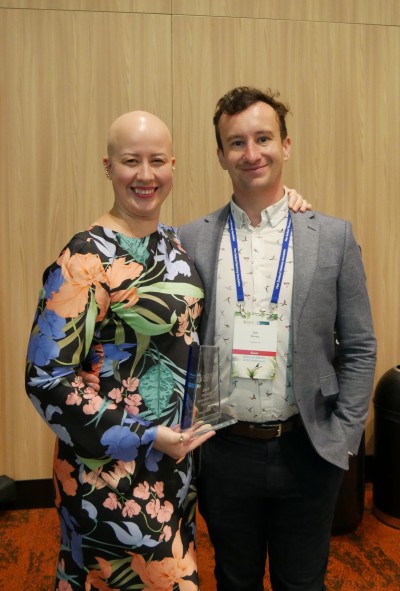 Jordi Hoult
Jordi Hoult
Over the past decade, Jordi Hoult has demonstrated exceptional veterinary skills, outstanding leadership, and a deep commitment to advancing the veterinary profession in Aotearoa.
Jordi’s career path exemplifies the versatility and value of veterinary expertise. Before joining the Department of Conservation earlier this year, Jordi worked at the Ministry for Primary Industries (MPI) in a variety of roles. During her time at MPI, she applied her veterinary background to lead initiatives that enhance food safety, animal welfare, and trade systems.
She helped develop the National Research Animal Framework, which balances international trade obligations with animal welfare standards, benefiting veterinarians, researchers and farmers alike. Similarly, Jordi’s leadership in clarifying food safety and animal welfare practices for production animals and wild game showcased the critical role veterinarians play in One Health.
Beyond her professional achievements, Jordi is a tireless advocate for the veterinary community. As a founding member of the NZVA’s Recent Graduate Advisory Group, she was a powerful voice for new veterinarians. She has also helped shape policies that support the sustainability of the profession through her position on the NZVA Policy Advisory Committee.
Jordi’s approachable and inclusive leadership style creates an environment where those around her are empowered to grow and succeed. Her mentorship through MPI, NZVA and GirlBoss inspires young veterinarians and professionals to explore diverse career pathways that showcase the breadth of skills veterinarians bring to any field.
Jordi’s contributions to the veterinary profession have been widely recognised. She was a finalist for the 2024 Primary Industries New Zealand Emerging Leader Award and the 2023 Zanda McDonald Award. In 2023, Jordi received the MPI Excellence Award for consistently demonstrating visible leadership through stakeholder connection, empathy, and opening doors for others. Jordi is also a graduate of the Kellogg Rural Leadership Programme, where her research focused on fostering leadership diversity in Aotearoa New Zealand’s agrifood sector.
These accolades reflect Jordi’s ability to connect veterinary expertise to broader societal challenges, positioning her as a leader within and beyond the profession. Her work serves as a powerful reminder of the impact veterinarians can have in diverse and unexpected ways.
Jordi’s vision for the future of the veterinary profession is one that embraces diversity, sustainability, and the proactive engagement of veterinarians in shaping policy and driving change. She proudly champions mental health and wellbeing in the veterinary profession, and actively participates in forums to improve inclusivity and workplace culture.
Jordi’s integrity, commitment to innovation, and leadership make her not just a skilled veterinarian, but also a visionary for the future of the profession. Her unwavering dedication and her ability to inspire those around her make her a deserving recipient of the Young Veterinarian Award for 2025.
Outstanding Service Award 2025
Stephen Hopkinson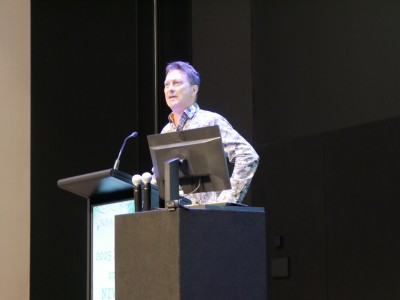
Stephen Hopkinson (or Hoppy, as he is more widely known), has shown an incredible level of service to both the veterinary profession and the NZVA during his career.
After graduating in 1990, Stephen started working at South Taranaki Veterinary Club, a veterinary practice dedicated solely to dairy cattle. He moved into the CEO role in 2003, leading the organisation through mergers to form Taranaki Veterinary Centre which currently employs 80 staff, including 29 progressive and well-respected veterinarians.
Hoppy is a dedicated and active member of the NZVA. He served on the Dairy Cattle Veterinarians (DCV) Branch Committee from 2012 to 2021, including three years as DCV President. During these nine years, Stephen showed exemplary leadership as the dairy industry navigated issues such as antimicrobial resistance, a move away from blanket dry cow therapy, and welfare standards of bobby calves.
As DCV President, Hoppy always had the profession’s best interests at heart. He worked tirelessly to lead the profession in the right direction while ensuring both internal and external collaboration. Hoppy played a key role in unifying the dairy veterinary community, ensuring veterinarians were seen as trusted professionals in the dairy industry.
In 2019, Stephen was the first person to be elected Chair of the NZVA’s Member Advisory Group (MAG), a role that also saw him join the NZVA Board. As the inaugural MAG Chair, Stephen had the unenviable role of clarifying the group’s role within our Association, which was already going through a significant transformation at the time. He did this with great skill, patience and determination, putting a huge amount of work into what is now a key group in the NZVA’s governance structure.
As well as his roles in the NZVA, Stephen has also served on the Veterinary Council of New Zealand (VCNZ) Complaints Assessment Committee, and the Veterinary Professional Insurance Society (VPIS) Board. These key industry leadership roles warrant significant recognition on their own, but it is Hoppy’s selfless dedication to the dairy veterinary industry that really sets him apart.
Whenever somebody is looking for an experienced dairy veterinarian with business skills and an understanding of the industry, Hoppy’s name is always high on the list. He was a founding member of XLVets New Zealand, was instrumental in the development of the WelFarm programme, and was a member of the NZVA Dairy Steering Group in 2011 and 2012.
Last year when the NZVA produced a series of myth-busting videos about antibiotics, it came as no surprise that Hoppy put up his hand to be involved. He became the face of the series, using his signature warmth and humour to raise awareness about antimicrobial resistance for World AMR Awareness Week.
Throughout his career, Stephen has invested huge amounts of energy, passion and personal commitment to Aotearoa New Zealand’s dairy industry, ensuring that veterinary professionals continue to play an integral role as the industry changes. For these reasons, we believe Stephen is a worth recipient of the Outstanding Service Award for 2025.
Veterinary Impact Award 2025
Ginny Dodunski 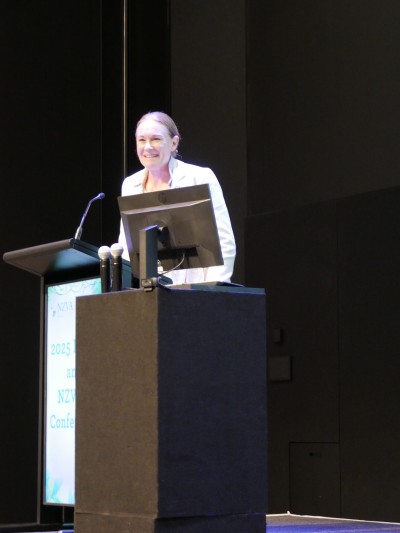
Ginny Dodunski is a true leader in both the veterinary and farming industries. She is an excellent facilitator, using her knowledge of farm systems, breeding ewe management, parasitology, deer and dairy sheep to educate veterinarians and farmers alike. Ginny’s nationally-recognised expertise in sustainable parasite management is matched only by her passion for sharing knowledge.
Ginny never set out to become a veterinarian. Growing up on a lifestyle block, she initially studied agricultural science at Massey University. It wasn’t until she took a paper on animal health that she started thinking about switching to veterinary science. Ginny’s agricultural science background has proven instrumental in her veterinary career, however, giving her a solid understanding of how soils, agronomy and animal production interact.
After graduating with a Bachelor of Veterinary Science in 1999, Ginny worked in the Manawatū where she gained a reputation as an exceptional graduate with a passion for people, farming and animals. In 2001, she moved to Queensland, Australia, where she was exposed to a different veterinary model and new reproductive work.
Upon her return to Aotearoa, Ginny focused on conducting on-farm trials, developing educational courses for Vet Sholar, and refining her agricultural extension capability. In 2014, she moved to Taumarunui where there was more scope for traditional large animal work on large-scale sheep and beef properties.
Eventually, she was drawn back to advisory work, however, joining Beef + Lamb New Zealand as the Wormwise Programme Manager in 2022. Since then, Ginny has significantly raised the programme’s profile through facilitator training, regulatory and select committee submissions, educational videos, podcast appearances, and an impressive social media presence.
Ginny’s unique communication skills allow her to share her knowledge widely. Ginny has appeared in numerous training videos, facilitated farmer extension groups, and written articles for newspapers, VetScript and the New Zealand Veterinary Journal. She has also presented at the International Sheep Veterinary Congress and at least nine NZVA conferences, covering topics from goat parasites and ewe nutrition in late pregnancy to pasture composition, campylobacter, and communication
Ginny is a Member of the Australian and New Zealand College of Veterinary Scientists in Medicine of Sheep. In 2021, the NZVA’s Sheep and Beef Cattle Veterinarians Committee voted unanimously to award Ginny with the branch’s highest honour, the Alan Baldry Award. This award recognises significant contributions to New Zealand’s sheep and beef cattle industry.
Ginny is loved by her colleagues, support staff, friends and clients. She has an insatiable hunger for new knowledge, and is always available to support colleagues, farmers and friends. In recognition of her dedication and contributions to the veterinary profession, we are pleased to award one of two Veterinary Impact Awards to Ginny for 2025.
Veterinary Impact Award 2025
Neil Chesterton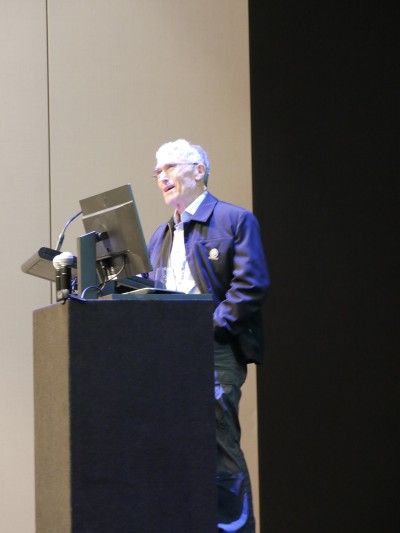
Born in South Africa and raised in Zimbabwe, Neil Chesterton completed his education in Sydney, graduating from Sydney University with a Bachelor of Veterinary Science in 1974. Since then, he has become an undisputed pioneer, leader and champion of lameness management both in Aotearoa and around the world.
Early in his career, Neil noticed a distinct lack of information about lameness in pasture-fed dairy cows. His subsequent investigations shaped what we know about lameness in pasture-based cattle today. After publishing his first peer-reviewed paper in the 1980s, Neil continued to work tirelessly to expand veterinary understanding of lameness, conduct his own research, and share his knowledge with others. Despite being published more than 30 years ago, that first paper remains a seminal paper in the history of lameness research.
Neil has played a leading role in developing training resources that are used by veterinarians and farmers around the world. Whether he’s attending local farm discussions, teaching students at Massey University, or speaking at national or international conferences, Neil’s depth of understanding and practical ideas always shine through. His skill as a teacher and his immense knowledge on cow management and lameness is recognised around the world.
Neil’s career has not just been defined by academic research. He spent much of his time out in the field as a local veterinarian, including treating lame cows, talking to farmers, and conducting his own research. Through his observations and understanding of cow behaviour, veterinarians and farmers understand the importance of considering the cow’s perspective.
Throughout his career, Neil has been supported by his wife, Sandra. Their path has led them to Pakistan and Afghanistan on a number of occasions, where their philanthropic aspirations were well received. In the early 1990s, Neil travelled to Pakistan to train veterinarians and allied veterinary professionals so they could re-establish veterinary clinics in war-torn Afghanistan. This project was funded by United Nations Development Programme, and had an enormous impact on the local communities.
In 2012, Neil travelled to Chile to investigate a lameness problem, and helped diagnose the secondary infection of lesions with bovine digital dermatitis. On his return, Neil began investigating the prevalence of digital dermatitis in Aotearoa New Zealand. Through careful observation, he discovered the presence of the skin disease and developed protocols to combat it’s spread.
Despite retiring from clinical practice in 2017, Neil’s enthusiasm and dedication to the veterinary and farming industries have not waned. His work continues in advisory and teaching roles, and he has been involved in research projects on dairy goats and risk factors for lameness.
It is no surprise that Neil has collected a number of accolades over the years. In 1989, he was awarded the Australian College of Veterinary Scientists College Prize for his work on lameness. He received the NZVA Dairy Cattle Veterinarians Golden Glove award in 2013, and was awarded an honorary Bachelor of Veterinary Science from Massey University the same year.
Neil’s enthusiasm and dedication have had an immense impact on the veterinary profession in Aotearoa, which is why we are pleased to award him one of two Veterinary Impact Awards for 2025.
President's Award 2025
Mark Bryan 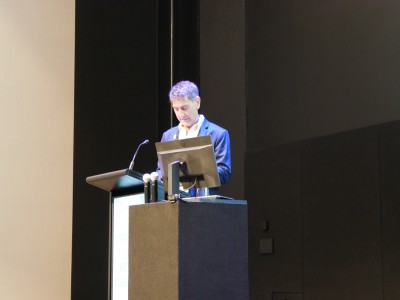
Throughout his career, Mark Bryan has demonstrated remarkable leadership, mentorship, and dedication to veterinary science and animal welfare. His impact extends across clinical practice, research, epidemiology, professional development, governance and advocacy.
Mark’s dedication to the NZVA is difficult to match, with 20 years of service on various boards and committees. In 2005, he joined the Dairy Cattle Veterinarians (DCV) Committee, where he served until 2014. During this time, Mark was instrumental in fostering strong relationships between the veterinary profession and key stakeholders, ensuring the NZVA remained at the forefront of industry developments.
In 2014, Mark joined the NZVA Board and became the Chair of the NZVA’s Antimicrobial Resistance Committee. During his tenure on the Board, Mark’s leadership and strategic vision helped improve professional standards, veterinary education, and animal welfare. He played a critical role in the NZVA’s Change Programme, which spanned several years of strategy meetings, planning, and implementation. Mark’s dedication has helped our association become more inclusive, increase member representation and feedback, and address the mental health crisis in the veterinary industry.
As Chair of the Antimicrobial Resistance Committee, Mark played a leading role in policy development, education initiatives, and advocacy for responsible antimicrobial use in veterinary medicine. In 2015, he led and fronted the NZVA’s aspirational goal that “By 2030 New Zealand will not need antibiotics for the maintenance of animal health and wellness”. Although this was seen as contentious at the time, this goal has helped halve New Zealand's antimicrobial use since 2015. Mark’s efforts in this area have been instrumental in shaping national strategies to combat AMR and ensuring best practices within the veterinary profession.
Mark’s ability to navigate complex issues and advocate for the profession has left a lasting impact on both the NZVA and the veterinary community in Aotearoa. This was highlighted during the Mycoplasma bovis outbreak, when Mark fiercely advocated for increased local veterinary involvement, after the profession was initially excluded.
Through research, advocacy, and practical implementation of welfare initiatives, Mark has helped shape policies and guidelines that promote better health, welfare, and ethical treatment of livestock. His research has helped develop innovative treatment protocols, enhanced pain management strategies, and the evaluation of new pharmaceuticals for veterinary use. Mark’s work in clinical research has gained international recognition, reinforcing his reputation as a leader in evidence-based veterinary medicine.
Mark’s professional journey has been defined by his passion for veterinary medicine, his innovative approaches to complex challenges, and his commitment to continuing education. He is committed to mentoring emerging veterinarians – whether he’s lecturing at Massey University, organising and hosting the infamous Swede Safaris for final year students, or developing rural practice opportunities for recent graduates.
Mark is also known for his courage to voice his opinion in the face of adversity. He is never afraid to stand up for what he believes is right, even when faced with opposition. His willingness to challenge outdated practices, advocate for necessary changes, and push for ethical standards in veterinary medicine has earned him immense respect within the profession. Mark is renowned for his sense of humour and dry wit, which he uses to navigate difficult conversations with integrity and professionalism.
Mark’s unwavering commitment, professional excellence, and outstanding contributions to the veterinary profession make him a deserving recipient of the President’s Award for 2025.
